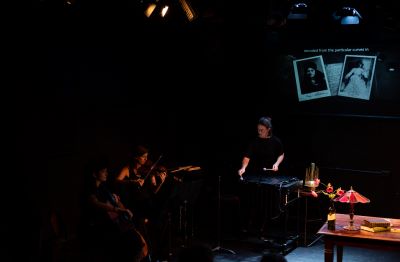Tenth Muse Initiative gives voice to a once infamous literary figure in a captivating series of opiate-like vignettes. Stewart Smith believes this production outdoes the original opera in every way.
Forgotten figure gets the royal treatment
1 February 2023
- Reading time • 4 minutesOpera
More like this
- Big Apple spin gives opera bite
- Menacing Otello takes total control
- Young singers in full voice for opera allsorts
The Priestess of Morphine, Tenth Muse Initiative
The Blue Room Theatre, 31 January 2023
“Burn me inside
until wings sprout on my savage soul
and I fall
headlong
into the beckoning bottomless pit.”
The Priestess of Morphine is a taut and highly-stylised portrait of one of the most interesting but little-known literary figures of last century.
Baroness Gertrud von Puttkamer (1881–1944), writing under the non de plume Marie-Madeleine, was the creator of a once infamous body of homo-erotic literature, ultimately revealing her alter ego as a morphine-addicted, sub-culture lesbian.
Picking through this material to form an hour-long opera, Aiden K. Feltkamp’s achingly poetic libretto divides into six scenes, exploring sensuality and suffocating trauma. Eschewing linear narrative for blurred opiate-like episodes, Jessica Taylor sings Baroness Gertrud while Ava Charleson sings her alter ego Marie-Madeleine.
Expert musical accompaniment is provided by Julia Watson (violin), Miranda Murray-Yong (cello) and Thea Rossen (vibraphone). Rosśa Crean’s evocative and compelling score, drawing on a century of American opera, amongst other influences, weaves the two singers and three instrumentalists in a captivating tapestry of sound and ideas.
In this Australian premiere, it’s difficult to imagine any of these performances being bettered. Taylor and Charleson are all you could wish for in young opera singers and both sing with utter conviction and dramatic intensity over the entire range of voice. Similarly, musical director Laurissa Brooke draws out not only meticulous ensemble playing but also contributions of real commitment and personality.

Rachel Doulton’s simple but effective direction complements Katrina Johnston’s similarly deft lighting and I was transfixed by Blair Parkinson’s beautiful and imaginative sepia-toned projections. Like the instrumental contributions, they were a constant throughout the work. The sung text was projected, too, which would have been meaningful had the operator managed to align what was being sung with what was being projected.
Marie-Madeleine’s cause célèbre was extinguished by the Nazis, who banned her books claiming them pornographic and degenerate. In 1943, under the watch of Nazi doctors, the baroness died in a sanatorium for morphine addiction.
Her resurrection is partly due to a recent English language anthology of her work and partly to Feltkamp and Crean’s 2019 The Priestess of Morphine. The opera, which has been performed only a few times, has something of an afterlife in a well-promoted audio recording and accompanying website. While it has the authority of the composer and is generally well executed, this Blue Room production from Hannah Lee Tungate’s Tenth Muse Initiative happily supersedes its exemplar in every way.
The Priestess of Morphine continues at The Blue Room Theatre until 4 February.
Pictured top: Jessica Taylor and Ava Charleson are the two sides of Baroness Gertrud in ‘The Priestess of Morphine’. Photo: Michelle Chong.
Like what you're reading? Support Seesaw.






